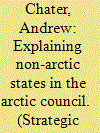| Srl | Item |
| 1 |
ID:
188772


|
|
|
|
|
| Summary/Abstract |
The story of Indigenous peoples and the government of Canada in the nineteenth and twentieth centuries is one of treaty violations, occupation of unceded territory, genocide, and discrimination by settlers. Progress has been immense over the last 50 years. The government of Pierre Trudeau’s 1969 White Paper called for the end of Indian Status and the Indian Act; only four years later, the Calder case recognized historical Indigenous land rights in a profound way. Nine years on, Indigenous rights were entrenched in Canada’s constitution. The strengthening of Indian status and historic land claim agreements followed. No doubt activism on the part of Indigenous peoples is a key explanatory variable. The 1970s and 1980s saw new recognition of human rights, equality, and the right to self-determination in the domestic context after the dismantling of legal segregation in North America as well as the creation of the Canadian Charter of Rights and Freedoms.
|
|
|
|
|
|
|
|
|
|
|
|
|
|
|
|
| 2 |
ID:
144560


|
|
|
|
|
| Summary/Abstract |
How has the role of observers in the Arctic Council evolved and why is there increased interest in participation by states and international institutions? This article examines the influence and interest of observers in international institutions. The Arctic Council is an international institution founded in 1996 to promote Arctic environmental protection and sustainable development. Ultimately, observers are weak actors in the Council. Despite this weakness, actors seek to become observers for two reasons. First, actors seek to contribute to the governance of environmental issues of global importance. Second, actors strive to gain as states develop the economic potential of the Arctic region.
|
|
|
|
|
|
|
|
|
|
|
|
|
|
|
|